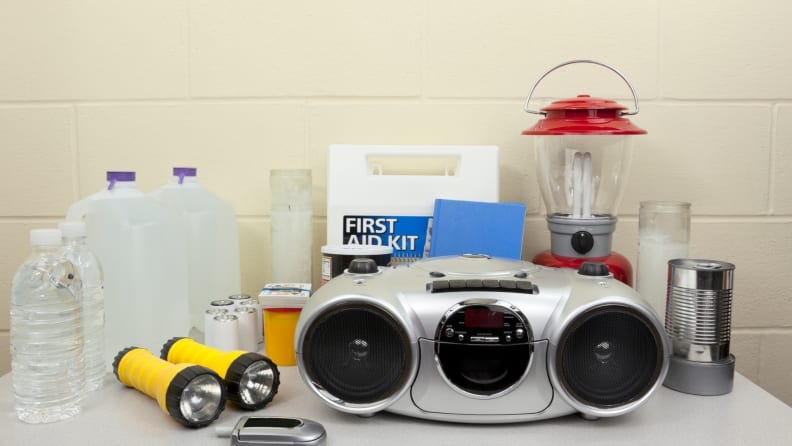After a quiet start, the 2025 hurricane season is beginning to stir. The National Hurricane Center is currently monitoring Tropical Storm Erin , which formed on August 11, as well as another system in the Atlantic, labeled Invest 96L, that has a lower chance of developing into a tropical depression.
At this time, there’s no immediate threat to Jacksonville. Forecasters say it’s still too early to predict whether either system will make landfall. However, the National Weather Service reports rough surf and deadly rip currents will be possible by Sunday and are expected to develop early next week. Moreover, temperatures in Jacksonville are also expected to rise throughout the week, possibly prompting heat advisories later in the week with heat index reaching between 105 to 110 degrees.
Still, Florida’s weather is notoriously unpredictable. With hurricane season spanning six months — from June 1 to November 30 — it’s always wise to stay prepared. Here’s what you should know before Erin or any future storm approaches land.
Make your hurricane plans now
Does everyone in the house or apartment know what to do if a storm comes? Go ahead and discuss among yourselves now how you’ll get in touch with each other, where you will go, and what you’ll do in case of emergency. Remember that in severe storm situations, phone service may be spotty or unavailable.
Make sure you know what zone you live in, in case evacuation orders are announced. You can check your address here.
Talk to your neighbors and compare plans, and make sure everyone has contact information.
Transit service ends when sustained winds near tropical storm force, so if you rely on buses, decide now how and when you’ll get around.
If you have chronic illnesses or other medical issues, make sure ahead of time that you’ll have an adequate supply of any needed medications, oxygen, etc.
Hurricane prep: House and yard
High winds can send debris hurtling toward your house at high speeds. Protecting your windows and sliding glass doors is important. (Don’t bother taping your windows, it does nothing.)
Walk around your yard and look for areas that will be a problem when the wind picks up. Move patio furniture into your garage or shed, trim your trees and shrubs, get rid of any yard debris and remove dead trees and branches, especially if they’re hanging over your house or driveway.
If you need professional help with that, it’ll be much easier (and possibly cheaper) to do it now than after the storm when there’s a waiting list.
Clean out your gutters.
Is your house leaking anywhere? How’s your weatherstripping? Take care of that now, before you get days of heavy rain and flooding. If your house is made of wood, check its structural connections. Give your roof a look for loose shingles or flashing or anything else that can be tightened up, nailed down or replaced.
Garage doors are usually a very vulnerable part of the house. Are yours in good, sturdy shape?
If you have any fences, decorative fountains, satellite dishes, solar panels, gazebos or other big outside structures, check them for damage and repair or replace anything that might come loose. Make sure you have hurricane straps for anything, like a shed, that might need additional anchoring.
Get some tarps. With luck, you won’t need them, but …
On a budget? On a budget? Here’s 5 cheap ways to prepare your home for Florida’s hurricane season
Hurricane prep: When is Florida’s disaster preparedness tax-free holiday?
In years past, there were scheduled tax-free holidays for disaster supplies. That’s not happening this year.
Instead, there’s a permanent year-round sales tax exemption on specific disaster preparedness items such as battiers, certain portable generators, five-gallon or less gas or diesel fuel cans, certain sizes of tarps, ground anchors and tie-down kits, and more.
How to hurricane prep the inside of your house?
If you’ve lived in Florida for more than a year, you already know the drill. It’s just a lot easier when everyone else isn’t rushing to Publix.
Inventory your household belongings. Take pictures or video a house and yard walkthrough and store them on a flash drive or in the cloud. Check your homeowner’s insurance, and make sure you have flood coverage. (If not, get it now, if you can afford it.)
Stock up on nonperishable food. If you do it early, you have a better chance of getting stuff you actually like when it’s on sale. Water, rain gear, cleaning supplies, batteries, hand-or-solar-powered chargers for your phones, hygiene items for yourself and any kids. Got a grill? Go ahead and get extra propane cylinders or charcoal.
Get three-month supplies of your regular medications, if your medical plan allows it. If not, be aware Florida Statute 252.538 waives time restrictions on prescription medication refills under certain conditions.
No house? You still need to be ready: It’s peak hurricane season. How do I prepare for a hurricane in my apartment?
Be ready to bug out: Idalia may have moved on, but it’s still important to prepare a go-bag or bug-out bag
If your home regularly loses power in storms, it might be time to start shopping for a generator. If you do, also get battery-powered, carbon-monoxide detectors inside your home.
Start making your emergency kits. Flashlights, batteries, first aid, a battery-powered radio.
Credit: Getty Images / JulNichols If local authorities are warning about a potential storm or power outage, prepare an emergency kit beforehand, if possible. Make sure it includes a hand-crank or battery-powered radio to stay up-to-date about your area’s situation.
Go ahead and set your most valuable papers aside to put into a waterproof container, to be kept on the highest level of your home. It’s not a bad idea to take pictures of important documents to keep on your phone.
Fill your gas tanks and check your vehicles for oil levels, air pressure, etc. If you have a generator, get fuel for it now.
Take care of your pets before the storm comes
Got pets? Now’s the time to plan what to do with them. Most shelters won’t allow pets, so research to find pet-friendly ones within reach. If you have the means, many motels and hotels allow pets but you’ll want to research ahead of time.
You’ll also want to get extra supplies of any food or medications they need.
If your pets have not been microchipped, get that done now and email a copy of the paperwork to yourself so you can access it if you’re not at home. You also should get an ID tag for your pet with your mobile phone number on it, if your pet doesn’t already have one.
Take new pictures of your pet from all angles (assuming you don’t already have a phone full of them) and store them online or email them to yourself.
Make sure you have a crate and/or carrier for your pet in case you need to evacuate. And find your pet’s vaccination paperwork now; you’ll need it for hotels or shelters.
Never too early to care for animals: From the Extension: Hurricane preparation for pet, livestock owners
Additional sources to help you prepare your home for a hurricane
Where is Tropical Storm Erin going? Here the cone of concern

Stay informed. Get text weather alerts
Support local journalism by subscribing to a Florida news organization.
This article originally appeared on Florida Times-Union: What forecasters are saying about Tropical Storm Erin and how to prep









